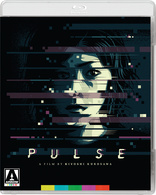Pulse Blu-ray Movie
HomePulse Blu-ray Movie 
回路 / Kairo / Blu-ray + DVDArrow | 2001 | 119 min | Not rated | Jul 11, 2017
Movie rating
7.2 | / 10 |
Blu-ray rating
| Users | 0.0 | |
| Reviewer | 3.5 | |
| Overall | 3.5 |
Overview
Pulse (2001)
Japanese university students investigate a series of suicides linked to an Internet Web cam that promises visitors the chance to interact with the dead.
Starring: Kumiko Asô, Koyuki, Koji Yakusho, Haruhiko Katô, Masatoshi MatsuoDirector: Kiyoshi Kurosawa
| Foreign | Uncertain |
| Horror | Uncertain |
| Drama | Uncertain |
| Mystery | Uncertain |
| Supernatural | Uncertain |
| Sci-Fi | Uncertain |
| Thriller | Uncertain |
Specifications
Video
Video codec: MPEG-4 AVC
Video resolution: 1080p
Aspect ratio: 1.78:1
Original aspect ratio: 1.85:1
Audio
Japanese: LPCM 2.0 (48kHz, 24-bit)
Subtitles
English
Discs
Blu-ray Disc
Two-disc set (1 BD, 1 DVD)
DVD copy
Playback
Region A (locked)
Review
Rating summary
| Movie | 3.5 | |
| Video | 3.0 | |
| Audio | 4.0 | |
| Extras | 4.0 | |
| Overall | 3.5 |
Pulse Blu-ray Movie Review
Ghost(s) in the machine.
Reviewed by Jeffrey Kauffman July 11, 2017The Police released their iconic album Ghost in the Machine in 1981, scoring a Number One chart placement in the United Kingdom and a Number Two in the United States (hey, you can’t have everything, right?), and offering another “take” on the subtext of the album’s title with one of the most successful singles of their career, “Spirits in the Material World”. Some twenty years later Japanese writer director Kiyoshi Kurosawa approached the same idea of a ghost in the machine with his now famous outing Pulse, a film which ultimately gave birth to an American version as well as two sequels. Kurosawa’s original film is quite a bit different from the Americanized treatment, though it of course revolves around the same basic conceit, namely that the spirit world is able to “reach out and touch” unsuspecting humans via that little technology known as the internet. There’s a really interesting foundational idea underlying this first version of Pulse which is frankly largely missing from its Americanized counterpart, an idea which on its face (ghostly or otherwise) would seem to be almost intentionally counter-intuitive. The then still relatively nascent internet was advertised as a force for good, a way to connect people dispersed around the globe, and a technology which could forge a global community. Instead, Pulse posits the internet as a force for evil that seems to draw some of its ghostly power from isolation. Over and over again in this frequently disturbing film, folks logging on find themselves alone (at least in the mortal realm), separated from friends and family and forced to confront apparitions that they have no way of understanding, let alone controlling.
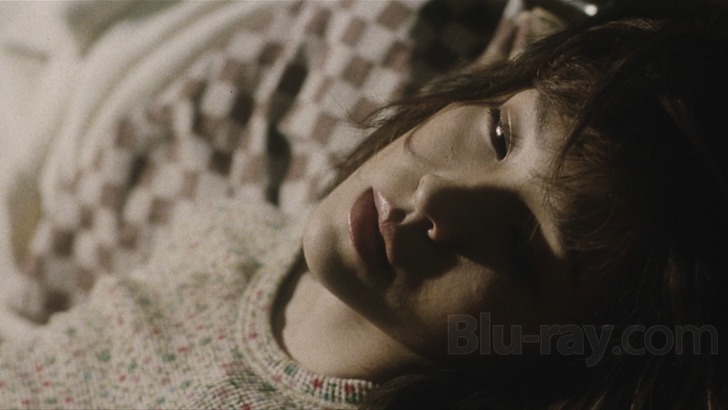
One of the ways the original Japanese version does in fact resemble its American counterpart is in the underlying paranoiac sensibilities that inform both films. While the Japanese Pulse basically posits two interlocking stories (something the American version doesn’t really explore), the entire unfolding of all the plot elements in Kurosawa’s prescient vision contain the same almost atavistic fear that so called “progress” in technology may actually lead to our demise. One way where the Japanese version is manifestly different than the American is with regard to kind of quasi- bookending elements featuring what is almost a nightmare vision on a steamer crossing the ocean, which is where Michi Kudo (Kumiko Aso) is introduced.
The nightmarish quality of this steamer material (look at the portentous sky in screenshot 6) sets an appropriately angst filled mood that the rest of the film exploits extremely well, especially once the main plot kicks in and a number of acquaintances and/or outright friends of Kudo’s begin killing themselves, all evidently after interactions online that seemingly suck their will to live right out of them. Kurosawa’s stagings throughout the film emphasize separateness, with characters often spied through wafting curtains or even through what appears to be a “point of view” perspective from within a computer monitor. Over and over again, the individual isolation being experienced by these characters supposedly enjoying the nascent “community” of being online is exploited, giving a lot of Pulse a palpable sense of dread.
This Pulse therefore tends to be a somewhat more “subliminal” experience than the American remake, one that tends to rely on a sense of unease rather than some of the jump cuts with startle effects that dotted the stateside version. There are a number of shocking deaths in this Pulse, but perhaps oddly (and no doubt intentionally) it’s the almost zombie like emotional tenor of the victims before their deaths that tend to be the most disturbing. That said, there’s very little emotional tether here to any of the characters. The film kind of drifts lethargically through a number of admittedly weird and frightening vignettes, but I doubt few viewers are actually going to care all that much as one character after another meet their fate. Of course, many contemporary viewers have been desensitized by decades now of being on the internet, which may be one of the major prophecies Kurosawa and Pulse offered to disbelieving eyes way back in 2001.
Pulse Blu-ray Movie, Video Quality 
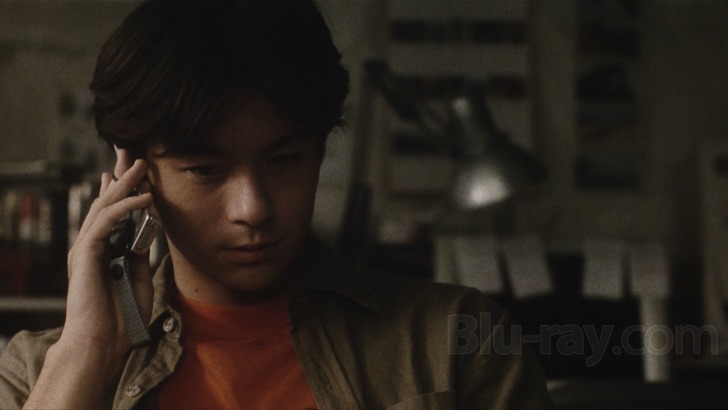
Pulse is presented on Blu-ray courtesy of Arrow Video with an AVC encoded 1080p transfer in 1.78:1. This is another recent Arrow release with only a generalist statement about the transfer in the insert booklet, to wit:
Pulse is presented in its original aspect ratio of 1.85:1 (sic) with 2.0 stereo sound. The High Definition master was made available for this release by Kadokawa Pictures.I admittedly never saw Pulse theatrically, and while it's evident that at least some of the stylistic proclivities of cinematographer Junichiro Hayashi have been rendered accurately here, the palette often looks drab and less vivid than some may expect, with a kind of "dupey" quality that seems faded and lackluster. There are also noticeable variances in clarity and grain structure, with some scenes looking relatively organic and relatively well detailed, and others having a decidedly chunkier, less detailed, appearance (see screenshot 8). While the IMDb reports this as having been shot on 35mm, a lot of this transfer has something more akin to a 16mm appearance, with attendant fuzziness and sometimes pretty noisy looking grain. Contrast and especially black levels are anemic at times, tending to make several scenes look kind of hazy and milky. Some occasional artifacts intrude in some of the darker moments, including what looks like some slight macroblocking in shadows. There is also occasional damage and transitory issues like a stray hair in the gate that can be spotted at times. As mentioned above in the main body of the review, Kurosawa and/or Hayashi repeatedly frame scenes with interstitial objects between the viewer and the ostensible focal character, something that helps to subliminally create the isolation and separation that is part and parcel of the film's subtext, but which also unavoidably leads to less fulsome detail levels. I'm scoring this at 3.0, though since at least some of the detail and perhaps even palette issues are intentional stylistic choices on the part of the creative team, some videophiles may feel that I'm being too harsh, while others may feel I'm being overly generous.
Pulse Blu-ray Movie, Audio Quality 
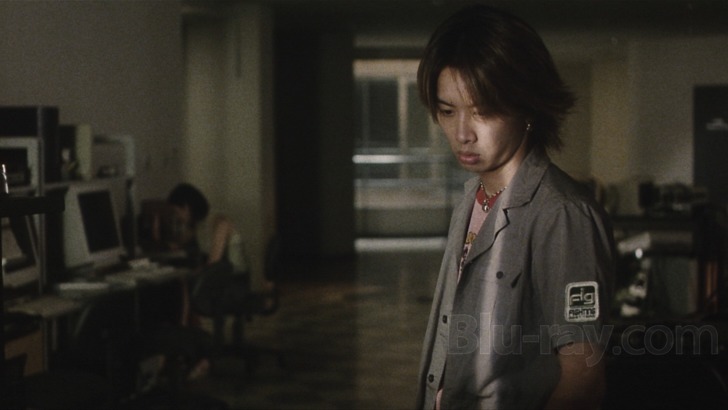
Pulse features an LPCM 2.0 track in the original Japanese which offers bursts of energy courtesy of "buzzing" computers and the like, but which derives a lot of its almost subliminal angst from simple effects like the scuffling of feet or the sound of taped shut doors being pried open. There's not a ton of stereo separation that I personally could discern, but the film's kind of "empty" sound design is delivered cleanly and clearly here, without any overt damage to report.
Pulse Blu-ray Movie, Special Features and Extras 
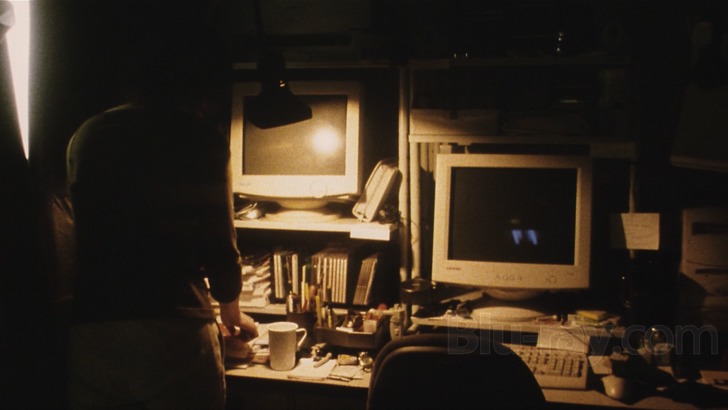
- Kiyoshi Kurosawa: Broken Circuits (1080p; 43:53) is a good, in depth interview with the writer and director of the film, who discusses aspects of his entire career in addition to this particular film.
- Junichiro Hiyashi: Creepy Images (1080p; 25:03) is an interview with the film's director of photography (take a gander at the alcohol collection in some shots).
- The Horror of Isolation (1080p; 17:11) features Blair Witch's Adam Wingard and Simon Barrett, who discuss this film's impact and influence on them.
- Archival Making of Featurette (1080i; 41:03)
- Tokyo Premiere Introduction (1080i; 7:04)
- Cannes Film Festival (1080i; 2:57) features footage from the film's screening there.
- Special Effects Breakdowns
- The Suicide Jump (1080i; 6:22)
- Harue's Death Scene (1080i; 5:02)
- Junko's Death Scene (1080i; 4:31)
- Dark Room Scenes (1080i; 10:18)
- TV Spots (1080p; 4:15)
- NHK Station IDs (1080i; 00:15)
Pulse Blu-ray Movie, Overall Score and Recommendation 
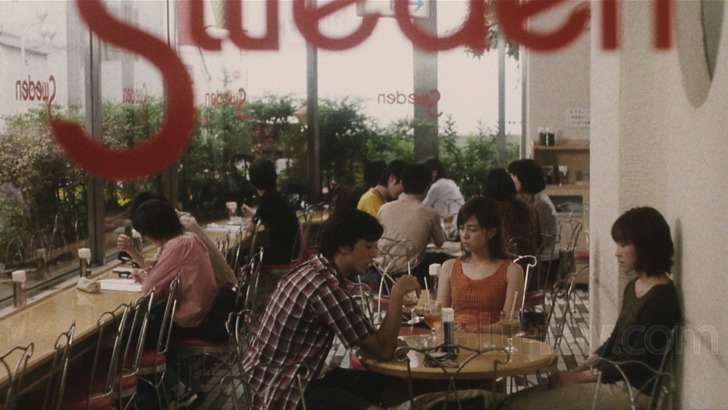
The Japanese Pulse is a manifestly different experience from the American remake, perhaps even more so than some other so-called J-Horror transplants. The film is strong on mood, but arguably lacking in narrative momentum. The video presentation may cause concern for some fans, but as usual Arrow has assembled a top flight collection of supplements which may help to allay some of those concerns. With caveats noted, Recommended.
Similar titles
Similar titles you might also like

Dark Water
Honogurai mizu no soko kara
2002

Spiral
Rasen / らせん
1998

A Tale of Two Sisters
장화, 홍련 / Janghwa, Hongryeon
2003

Ringu
Ring
1998

Ringu 0
Ring 0 / Ringu 0: Bâsudei
2000

Ringu 2
Ring 2
1999

The Wailing 4K
곡성 / Goksung
2016

Suicide Club
自殺サークル
2001

Evolution
2015

The Orphanage
El Orfanato
2007

Onibaba
鬼婆
1964

Godzilla 4K
ゴジラ / Gojira / includes "Godzilla, King of the Monsters!" (1956) on BD
1954

Rigor Mortis
殭屍
2013

The Devil's Backbone
El espinazo del diablo
2001

The H-Man
Bijo to Ekitainingen
1958

The Corruption of Chris Miller
La corrupción de Chris Miller
1973

The Nameless
Los sin nombre
1999

Cure
キュア / Kyua
1997

Gonjiam: Haunted Asylum
곤지암
2018

Three
Sam gang
2002
